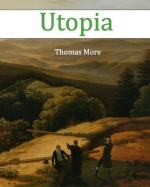“Thus though the rabble of mankind look upon these, and on innumerable other things of the same nature, as pleasures, the Utopians, on the contrary, observing that there is nothing in them truly pleasant, conclude that they are not to be reckoned among pleasures; for though these things may create some tickling in the senses (which seems to be a true notion of pleasure), yet they imagine that this does not arise from the thing itself, but from a depraved custom, which may so vitiate a man’s taste that bitter things may pass for sweet, as women with child think pitch or tallow taste sweeter than honey; but as a man’s sense, when corrupted either by a disease or some ill habit, does not change the nature of other things, so neither can it change the nature of pleasure.
“They reckon up several sorts of pleasures, which they call true ones; some belong to the body, and others to the mind. The pleasures of the mind lie in knowledge, and in that delight which the contemplation of truth carries with it; to which they add the joyful reflections on a well-spent life, and the assured hopes of a future happiness. They divide the pleasures of the body into two sorts—the one is that which gives our senses some real delight, and is performed either by recruiting Nature and supplying those parts which feed the internal heat of life by eating and drinking, or when Nature is eased of any surcharge that oppresses it, when we are relieved from sudden pain, or that which arises from satisfying the appetite which Nature has wisely given to lead us to the propagation of the species. There is another kind of pleasure that arises neither from our receiving what the body requires, nor its being relieved when overcharged, and yet, by a secret unseen virtue, affects the senses, raises the passions, and strikes the mind with generous impressions—this is, the pleasure that arises from music. Another kind of bodily pleasure is that which results from an undisturbed and vigorous constitution of body, when life and active spirits seem to actuate every part. This lively health, when entirely free from all mixture of pain, of itself gives an inward




